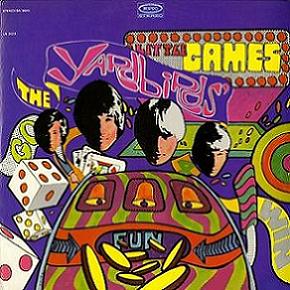Revision as of 19:21, 9 April 2010 by imported>Meg Taylor
| Little Games
|

|
| Type
|
Studio album
|
| Artist
|
The Yardbirds
|
| Release Date
|
17 July 1967
|
| Recorded
|
29 April - 1 May 1967 at De Lane Lea Studios, London.
|
| Genre
|
Blues rock, rock
|
| Language
|
English
|
| Length
|
30 min 28 sec
|
| Label
|
Epic Records
|
| Catalogue
|
BN 26313 (US)
|
| Producer
|
Mickie Most
|
| Engineer
|
Dave Siddle
|
Little Games is an album by English blues rock band the Yardbirds, released in July 1967. Successful singles producer Mickie Most was called in to assist the Yardbirds but expectations of this release turning the commercial fortunes of the band around, were misplaced. The group disbanded in 1968.
Jimmy Page used his guitar-bowing technique on "Tinker Tailor Soldier Sailor" and "Glimpses". The album peaked at #80 on Billboard's Pop Albums chart. The album title track is the first of several tracks that producer Mickie Most would exempt Jim McCarty from participating in. McCarty was unable to participate full-time due to illness and was replaced by Clem Cattini (uncredited). Chris Dreja was also unavailable for many of the sessions and was replaced by John Paul Jones (uncredited).
| Album information
|
|
Track listing:
- "Little Games" (Harold Spiro, Phil Wainman) – 2:25
- "Smile On Me" (Chris Dreja, Jim McCarty, Jimmy Page, Keith Relf) – 3:16
- "White Summer" (Jimmy Page) – 3:56
- "Tinker, Tailor, Soldier, Sailor" (Jimmy Page, Jim McCarty) – 2:49
- "Glimpses" (Chris Dreja, Jim McCarty, Jimmy Page, Keith Relf) - 4:24
- "Drinking Muddy Water" (Chris Dreja, Jim McCarty, Jimmy Page, Keith Relf) – 2:53
- "No Excess Baggage" (Roger Atkins, Carl D'Errico) – 2:32
- "Stealing Stealing" (trad. arr. Chris Dreja, Jim McCarty, Jimmy Page, Keith Relf) – 2:42
- "Only the Black Rose" (Keith Relf) – 2:52
- "Little Soldier Boy" (Jim McCarty, Jimmy Page, Keith Relf) - 2:39
|
1992 Expanded edition
An expanded Little Games edition entitled Little Games Sessions and More, was released as a 2 disc set featuring additional sessions and alternate takes from the period, plus the singles "Ha Ha Said the Clown", "Ten Little Indians", and "Goodnight Sweet Josephine".
Chart positions
Album
| Chart (1967)
|
Peak position
|
| US Billboard The 200 Albums Chart (Pop Albums)[1]
|
80
|
Singles
| Year
|
Single
|
Chart
|
Position
|
| 1967
|
"Little Games"
|
UK Singles Chart[2]
|
52
|
| 1967
|
"Little Games"
|
US Billboard Hot 100 Singles Chart (Pop Singles)[3]
|
51
|
| 1967
|
"Little Games"
|
US Cash Box Top 100 Singles Chart[4]
|
48
|
| 1967
|
"Little Games"
|
US Record World 100 Top Pop Chart[5]
|
44
|
| 1967
|
"Little Games"
|
Australian Go-Set Top 40 Singles Chart[6]
|
27
|
| 1967
|
"Ha Ha Said the Clown"
|
US Billboard Hot 100 Singles Chart (Pop Singles)[7]
|
45
|
| 1967
|
"Ha Ha Said the Clown"
|
US Cash Box Top 100 Singles Chart[8]
|
52
|
| 1967
|
"Ha Ha Said the Clown"
|
US Record World 100 Top Pop Chart[9]
|
45
|
| 1967
|
"Ten Little Indians"
|
US Billboard Hot 100 Singles Chart (Pop Singles)[10]
|
96
|
| 1967
|
"Ten Little Indians"
|
US Cash Box Top 100 Singles Chart[11]
|
71
|
| 1968
|
"Goodnight Sweet Josephine"
|
US Billboard Hot 100 Singles Chart (Pop Singles)
|
127
|
| Personnel
|
- Musicians:
- Keith Relf – vocals, harmonica
- Jimmy Page – acoustic guitar, electric guitar, backing vocals
- Chris Dreja – bass guitar
- Jim McCarty - drums, percussion, backing vocals
- Additional musicians:
- John Paul Jones - bass guitar, cello on "Little Games", and string arrangements
- Nicky Hopkins – keyboards
- Clem Cattini – drums
- Production:
- Mickie Most – producer
- Dave Siddle - engineer, mixing
|
Notes
